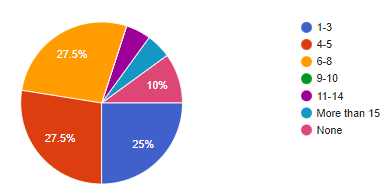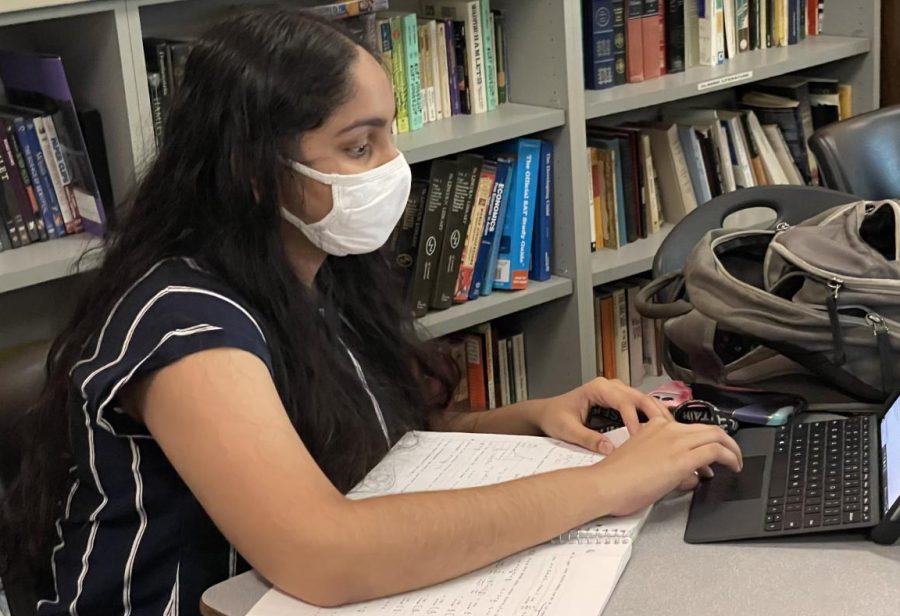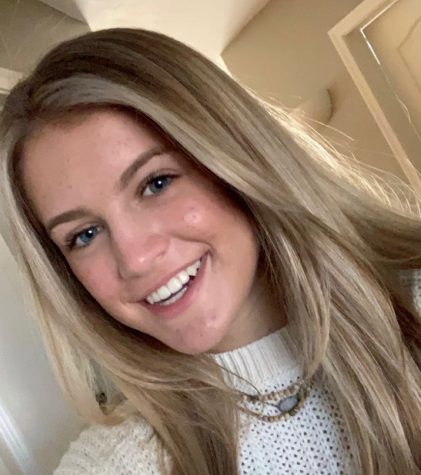Looking ahead
College applications trigger excitement, stress among seniors
Vishwa Vashi works on her college essay during Mr. Sheh’s IB English IV class. “It’s tough–it’s a meticulous process. College essays (a different one for every college) applications, recommendations–it’s just a lot,” said Vashi, who is hoping to attend Duke, but would be happy attending Arizona State University majoring in biology with a focus on neuroscience. “But you get to know more about yourself.” About 45 percent of this year’s seniors are hoping to attend a university out of state, according to a recent Wolf’s Print poll.
November 5, 2021
The symptoms are already appearing around campus.
Procrastination. Lack of effort. Missing the occasional day of school.
The dreaded senioritis–which inevitably afflicts prospective graduates in April and May, has arrived a bit early–thanks to college application season. The process, which includes countless applications, essays, and recommendations, has seniors feeling excited but stressed, they said.
“I 100 percent have senioritis, especially coming off of online classes during COVID,” said senior Kaylin Lacher.
Captain of the school’s track and cross country team, Lacher has been focused on next year.
“I haven’t been taking my classes as serious[ly] as I used to and I don’t really care about missing days of school,” she said. “You kind of just get the attitude of I just want to be done with high school.”
In order to graduate high school, each student need to have 22 credits: four English, three history, four math, three science, one physical education, one fine arts or career education, six electives and a state civic exam.
Seniors should ‘get ahead’
But even with graduation more than a semester away, seniors already are focused on college.
According to a recent Wolf’s Print survey, nearly 47 percent of seniors feel that the college essays were the most difficult part. More than 34 percent of seniors say starting the essays was the most difficult part, 6.3 percent say waiting while the other 6.3 percent say gathering letters of recommendation is hardest. Only about 3 percent say filling out financial aid was the most challenging aspect of college admissions.
“Get ahead on the essays,” said Mrs. Dorsch, DM’s college and career counselor. “That would be something you could do ahead of time and get that word document that you are going to upload absolutely pristine.”
In the survey, seniors recommended that candidates look for similarities in different essay questions for the colleges; this can help seniors write less crafting the essay to fit multiple prompts.
“The most difficult part of the application process (for me) was the essays,” said senior Luke Miller. “The essays are what allow students to differentiate themselves from other applicants, and so it is important to write them well.
“It’s very hard to be succinct with these essays, and that was the hardest part of the process. It took months to write and polish my essays.”
Mrs. Dorsch recommends that seniors start well before fall break.
“I think that they should be looking at it over the summer. I know that is really hard, but I think that if you can at least get the skeleton of your essay put together,” she said. “if you’ve got all of these random prompts that you need to do, get ahead of it for sure.”
That will provide time to help students strike the perfect tone.
“Make sure they are interesting and unique,” Dorsch said, “they tell your story, they’re written in your voice and make sure they are grammatically perfect.”
The future is now

“My favorite school is Tufts University,” said Miller, who runs both track and cross country. “I have verbally committed there for track and field, and I couldn’t be happier.”
Tatum Woisin, is another senior who has committed and says, “I already got in to ASU Walter Cronkite.”
All about the journey
Students say they will always remember–even after they graduate from university–the journey of deciding on a college and the accompanying stress.
“My college journey has been incredibly tedious,” said senior track and cross country captain Luke Miller. “It was definitely stressful from start to finish, and I’m incredibly relieved that it’s basically over now.”
Lacher said she wants to continue running cross country and track in college.
“When I was looking at colleges I was researching cooler weather, good running schools and good sports psychology programs because that’s what I want to major in,” she said. “The journey has definitely been a stressful one. I want to run in college so that’s added another thing to think about.”
Adding to the stress is financial matters; even if students are accepted into their dream school, they may not be able to afford it.
Mrs. Dorsch recommends all students apply for FASFA, the federal application for student aid; the federal government will help families pay for college.
“The amount that you would get is based on yours and your parents tax returns, so if you are a family that earns a lot of money, you probably are not going to get as much financial aid from the federal government,” Dorsch said. “But most people will get something.”
Applicants can earn up to $50,000 in loans that are low interest; students would not have to start paying until graduation.
“There is definitely a benefit to do it,” she said.
‘Don’t worry’
Grades are also a consideration; a 3.0 GPA or higher is optimal.
“he odd C is fine, but if you have more C’s than anything else, that’s going to be a problem, so address it early,” Dorsch said.
“If you want to do anything in honors or at a selective school, you need to take the most rigorous classes that you can handle and address that early,” she said, “because they will look at all four years of your course selection.”
It’s never too early to start drafting essays and requesting letters of recommendation from teachers, seniors said in the survey.
And more than half the students in the survey indicated they wanted to stay in state.
“Going away to college is not for everybody,” Mrs. Dorsch said. Students can enter a trade school, community college, EVIT, or even take a gap year.
“There are so many ways to educate yourself and get a career going. Evit has so many great programs, SCC has so many great things, you could go to beauty school, you could go to audio recording school.
“Don’t worry about it,” she said. “There are so many other ways that you can make it work.”
Ultimately, Dorsch said, where students attend school is not as important as their attitude when the go to college.
“There is something out there for everybody,” she said. “There is a fit for everybody.”



